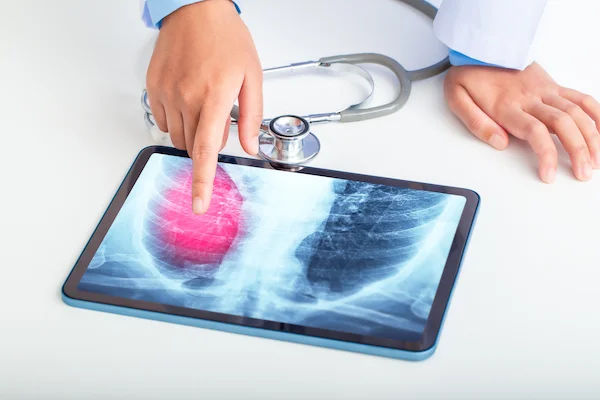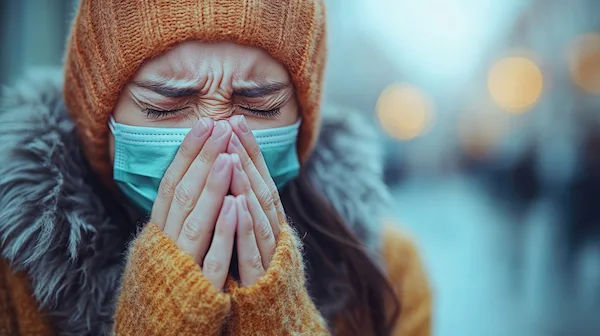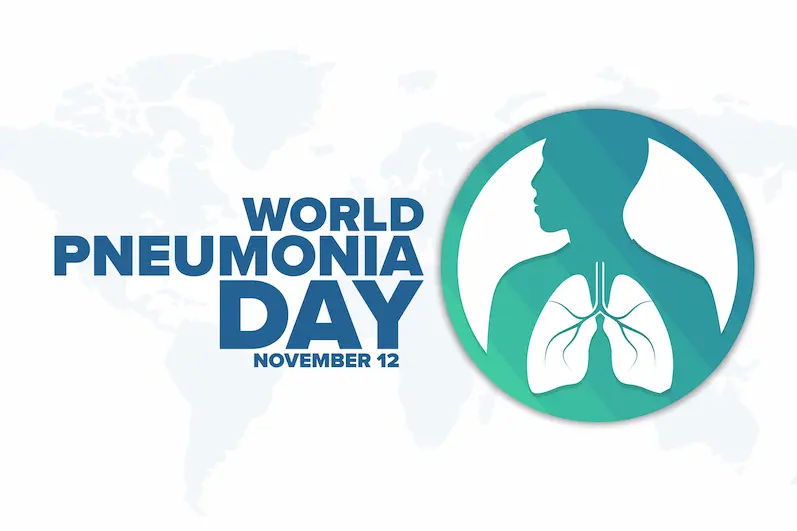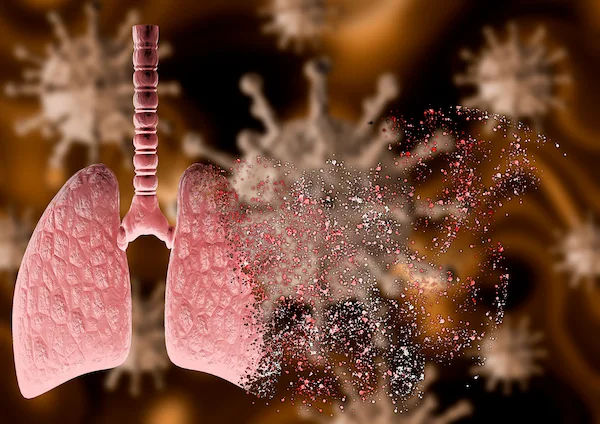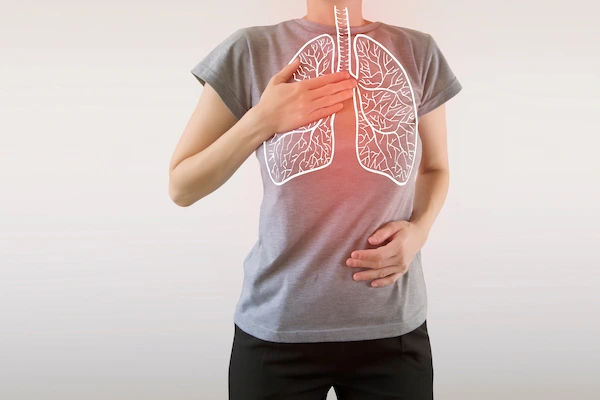Guide to Comprehensive Guide To Pneumonia
Understand pneumonia with our comprehensive guide. Learn about its causes, symptoms, diagnosis, treatment options, and prevention strategies to protect your health.

Written by Dr. Mohammed Kamran
Reviewed by Dr. Rohinipriyanka Pondugula MBBS
Last updated on 13th Jan, 2026

Pneumonia is a common yet serious respiratory infection that inflames the air sacs in one or both lungs. These sacs may fill with fluid or pus, causing a phlegmy cough, fever, chills, and difficulty breathing. While it can range from mild to life-threatening, understanding this condition is the first step toward prevention and effective treatment. This comprehensive guide will walk you through everything you need to know about pneumonia—from its earliest symptoms and underlying causes to modern treatment options and the recovery process. Whether you're concerned for yourself or a loved one, this article aims to be your trusted resource for navigating this challenging illness, empowering you with knowledge to protect your lung health.
What is Pneumonia? Understanding the Lung Infection
Pneumonia is an infection that causes inflammation in the alveoli, the tiny air sacs in your lungs. When you have pneumonia, these sacs, which are normally filled with air, become filled with pus and other liquid. This makes breathing painful and limits oxygen intake.
How Pneumonia Affects Your Lungs and Airways?
When a harmful organism (like bacteria or a virus) is inhaled into your lungs, your body’s immune system sends white blood cells to attack the infection. This battle between the invaders and your immune cells causes the alveoli to become inflamed and fill with fluid. This process disrupts the normal gas exchange—where oxygen is taken in and carbon dioxide is expelled—leading to the classic symptoms of shortness of breath and fatigue. The infection can be confined to a small section of the lung (lobar pneumonia) or be spread throughout in patches (bronchopneumonia).
Consult a General Physician
Recognizing the Signs: Common Pneumonia Symptoms
Symptoms can vary greatly depending on the type of germ causing the infection, your age, and your overall health. They often mimic those of a severe cold or flu but typically last longer and are more intense.
Symptoms in Adults
- Cough: Often producing phlegm (sputum) that may be green, yellow, or even bloody.
- Fever: Which can be high and accompanied by sweating and chills.
- Shortness of breath: Especially during physical activities or even while resting in severe cases.
- Chest pain: Sharp or stabbing pain that worsens when you breathe deeply or cough.
- Fatigue: Extreme and persistent tiredness.
- Confusion: Particularly common in older adults.
Symptoms in Children and Infants
- Children may exhibit the same symptoms as adults, but infants might show more nonspecific signs:
- Fever, cough, and fast or labored breathing (look for grunting or wheezing).
- Irritability, lethargy, and decreased activity.
- Vomiting and poor feeding.
- In severe cases, a bluish tint to the lips and nails (cyanosis) indicates a lack of oxygen.
When to Seek Emergency Medical Care?
Seek immediate medical attention if you or a loved one experience:
- Difficulty breathing or severe shortness of breath.
- Persistent fever above 102°F (39°C).
- Chest pain that is severe.
- A bluish color on lips or fingertips.
- Sudden confusion or disorientation, especially in the elderly.
The Causes of Pneumonia: Bacteria, Viruses, and More
Pneumonia is classified by the types of germs that cause it and where the infection was acquired.
Community Acquired Pneumonia (CAP)
This is the most common form, acquired outside of healthcare settings.
- Bacterial: Streptococcus pneumoniae is the most common cause. Mycoplasma pneumoniae causes "walking pneumonia," a typically milder form.
- Viral: Respiratory viruses, including influenza (flu), RSV, and SARSCoV2 (COVID19), are frequent causes, especially in children.
- Fungal: Less common and usually occurs in people with chronic health problems or weakened immune systems.
Hospital Acquired Pneumonia (HAP)
This type develops during a hospital stay for another illness. It can be more serious because the bacteria involved are often more antibiotic-resistant, and patients are already sick.
Aspiration Pneumonia
This occurs when you inhale food, drink, vomit, or saliva into your lungs. This is more likely if something disturbs your normal gag reflex, such as a brain injury, swallowing problems, or excessive use of alcohol or drugs.
Walking Pneumonia (Atypical Pneumonia)
This is a nonmedical term for a mild case of pneumonia, often caused by Mycoplasma pneumoniae. You may feel well enough to be "walking around" and not realize you have pneumonia, mistaking it for a bad cold.
Are You at Risk? Key Pneumonia Risk Factors
Certain groups of people are at a higher risk of developing pneumonia:
- Age: Children aged 2 or younger and adults aged 65 or older.
- Chronic Diseases: Asthma, COPD, heart disease, or diabetes.
- Weakened Immune System: Due to HIV/AIDS, chemotherapy, organ transplant, or long-term steroid use.
- Smoking: Damages your lungs' natural defenses against respiratory infections.
- Hospitalization: Especially if in the ICU or on a ventilator.
- Difficulty Coughing or Swallowing: Due to stroke, dementia, or other neurological conditions.
Getting a Diagnosis: How Doctors Identify Pneumonia
If early signs of pneumonia like a persistent cough and fever are present, a doctor will perform several steps to confirm the diagnosis.
The Physical Examination and Medical History
The doctor will listen to your lungs with a stethoscope. Crackling, bubbling, or rumbling sounds during inhalation are often telltale signs that the alveoli are filled with fluid.
Diagnostic Tests: From XRays to Blood Tests
- Chest Xray: This is the primary test to confirm pneumonia and locate the infection in your lungs.
- Blood Tests: A complete blood count (CBC) can check your white blood cell count, indicating an infection.
- Blood cultures can identify the germ causing the infection if it has entered your bloodstream.
- Sputum Test: A sample of fluid from your lungs (sputum) is analyzed to help pinpoint the cause of the infection.
- Pulse Oximetry: A small sensor measures the oxygen level in your blood, as pneumonia can prevent your lungs from moving enough oxygen into your bloodstream.
If your symptoms persist beyond two weeks, consult a doctor online with Apollo24|7 for further evaluation and to discuss if you need any diagnostic tests. Apollo24|7 offers convenient home collection for tests like CBC or CRP to aid in diagnosis.
Pneumonia Treatment: How to Fight the Infection
Treatment depends entirely on the cause and severity of your pneumonia. It is crucial to follow your doctor's plan precisely.
Treating Bacteria vs. Viral Pneumonia
- Bacterial Pneumonia: Treated with antibiotics. It's vital to take the entire course, even if you start feeling better, to prevent a relapse and antibiotic resistance.
- Viral Pneumonia: Antibiotics are ineffective. Treatment focuses on rest, fluids, and symptom management (e.g., fever reducers). Antiviral medications may be prescribed if the flu virus is the cause.
Hospitalization for Severe Pneumonia
You may need hospital care if you are an older adult, have a high risk of complications, or have severe symptoms. Hospital treatment may include:
- Intravenous (IV) antibiotics administered directly into a vein.
- Respiratory therapy to deliver medications directly into the lungs.
- Oxygen therapy to maintain oxygen levels in your blood.
The Role of Supportive Care at Home
For mild cases, pneumonia treatment at home is effective:
- Get plenty of rest to help your body fight the infection.
- Stay hydrated by drinking water, broth, and herbal tea to loosen mucus and prevent dehydration.
- Manage fever and pain with over-the-counter medications like acetaminophen or ibuprofen.
- Use a humidifier to ease breathing and reduce coughing.
The Road to Recovery: What to Expect
Recovery time varies. Young, healthy people may feel better in a week, while others may take a month or more to regain their full strength. Fatigue and a lingering cough are common for several weeks.
Managing Recovery and Preventing Relapse
- Don't rush back to work or school until your fever is gone and you're coughing less.
- Complete all medications as prescribed.
- Eat a nutritious diet to support your immune system.
- Attend all followup appointments to ensure the infection has fully cleared.
Prevention is Key: How to Protect Yourself from Pneumonia
The Importance of Vaccination
Vaccines are the most effective way to prevent certain types of pneumonia.
- Pneumococcal vaccines (PCV13, PPSV23) protect against the most common bacterial cause.
- Flu shot: Since the flu is a common cause of viral pneumonia, getting vaccinated annually is crucial.
- COVID19 vaccine: Protects against severe illness from SARSCoV2, which can lead to pneumonia.
- Hib vaccine: Protects against Haemophilus influenzae type b (Hib), another type of bacteria that can cause pneumonia.
Healthy Habits to Boost Your Immunity
- Wash your hands regularly with soap and water.
- Don't smoke and avoid secondhand smoke, which damages your lungs' defenses.
- Get enough sleep, exercise regularly, and eat a healthy diet.
- Practice good respiratory hygiene: Cover your mouth and nose when coughing or sneezing.
Quick Takeaways: Key Points on Pneumonia
- Pneumonia is an infection that inflames the air sacs in the lungs, filling them with fluid.
- Symptoms include a productive cough, fever, chills, and difficulty breathing.
- It can be caused by bacteria, viruses, or fungi and is diagnosed with a chest Xray.
- Treatment depends on the cause: antibiotics for bacteria, supportive care for viruses.
- Recovery can take time, with fatigue often lingering for weeks.
- Vaccination (pneumococcal and flu shots) is the best prevention.
- Always complete your prescribed course of medication, even if you feel better.
Consult a General Physician
Conclusion
Pneumonia is a significant health concern, but it is often preventable and treatable. This comprehensive guide has outlined the crucial steps from recognizing the symptoms to understanding the causes and navigating treatment options. The key to a successful recovery lies in early detection, appropriate medical care, and diligent selfcare. By prioritizing prevention through vaccination and healthy lifestyle choices, you can significantly reduce your risk. Remember, your health is your greatest asset. If you or someone you know is exhibiting signs of a respiratory infection, do not hesitate to seek professional medical advice. If your condition does not improve after trying these methods, book a physical visit to a doctor with Apollo24|7 for a thorough examination and personalized care plan.
Consult a General Physician

Dr. Rajib Ghose
General Physician/ Internal Medicine Specialist
26 Years • MBBS
Kolkata
B Ghose Foundation Doctor's Chamber, Kolkata
(50+ Patients)

Dr. Rajib Ghose
General Physician/ Internal Medicine Specialist
25 Years • MBBS
East Midnapore
VIVEKANANDA SEBA SADAN, East Midnapore

Dr. Rohinipriyanka Reddy
General Practitioner
9 Years • MBBS
Hyderabad
Apollo 24|7 Clinic, Hyderabad

Dr Summaiya Banu
General Practitioner
8 Years • MBBS
Hyderabad
Apollo 24|7 Clinic, Hyderabad
(250+ Patients)

Dr. D Bhanu Prakash
General Practitioner
10 Years • MBBS, AFIH, Advanced certificate in critical care medicine, Fellowship in critical care medicine
Hyderabad
Apollo 24|7 Clinic, Hyderabad
Consult a General Physician

Dr. Rajib Ghose
General Physician/ Internal Medicine Specialist
26 Years • MBBS
Kolkata
B Ghose Foundation Doctor's Chamber, Kolkata
(50+ Patients)

Dr. Rajib Ghose
General Physician/ Internal Medicine Specialist
25 Years • MBBS
East Midnapore
VIVEKANANDA SEBA SADAN, East Midnapore

Dr. Rohinipriyanka Reddy
General Practitioner
9 Years • MBBS
Hyderabad
Apollo 24|7 Clinic, Hyderabad

Dr Summaiya Banu
General Practitioner
8 Years • MBBS
Hyderabad
Apollo 24|7 Clinic, Hyderabad
(250+ Patients)

Dr. D Bhanu Prakash
General Practitioner
10 Years • MBBS, AFIH, Advanced certificate in critical care medicine, Fellowship in critical care medicine
Hyderabad
Apollo 24|7 Clinic, Hyderabad
More articles from Pneumonia
Frequently Asked Questions
Is pneumonia contagious?
Yes, the germs that cause pneumonia (both viral and bacterial) can be contagious. They are spread through airborne droplets from a cough or sneeze. However, catching the germ doesn't always mean you'll develop pneumonia.
How long does pneumonia last?
The timeline varies. With treatment, symptoms can start improving in a week, but fatigue and a cough can linger for a month or longer, especially in older adults or those with underlying health conditions.
What is the best antibiotic for pneumonia?
There is no single 'best' antibiotic. The choice depends on the specific bacteria causing the infection, your age, health, and local antibiotic resistance patterns. A doctor will prescribe the most appropriate one.
What is the difference between pneumonia and bronchitis?
Bronchitis is an inflammation of the bronchial tubes (airways), while pneumonia is an infection deeper in the lungs (air sacs). Pneumonia is generally more severe, with a higher fever and more pronounced shortness of breath.
Can you die from pneumonia?
Unfortunately, yes. Pneumonia can be life-threatening, especially for infants, the elderly, and those with compromised immune systems or chronic diseases. This is why prompt diagnosis and treatment are critical.
